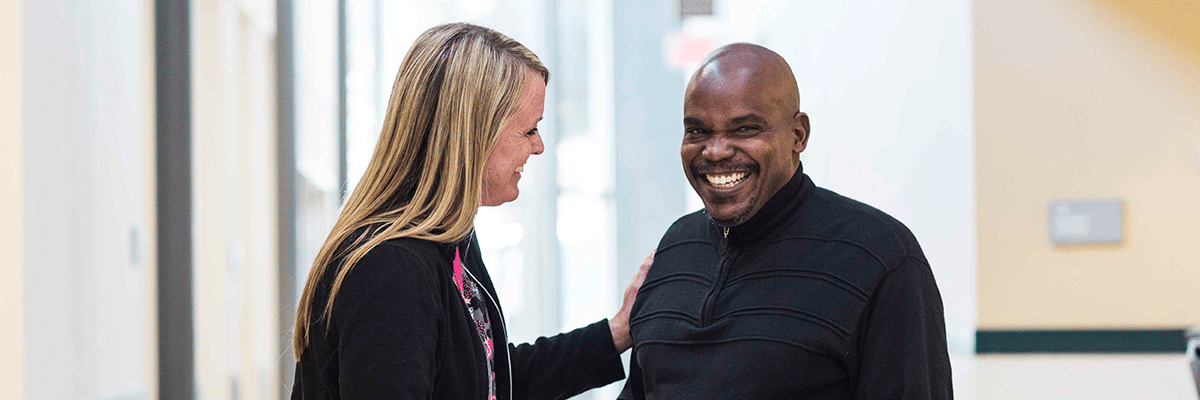Services

We Specialize in You
Cancer can be frightening and confusing. At Grady, we believe no one should face it alone.
Our doctors, nurses, and other specialists are cancer experts but, most importantly, they specialize in you and your needs. We will be a steady companion and partner, helping you choose just the right treatment, providing the information you want about the disease, and offering the support you need to get through the experience. Everyone’s journey is unique, we help you make the right decisions for you and arrange appointments that work with your schedule. And, where possible, we help you juggle personal and professional responsibilities. After all, life doesn’t stop when cancer strikes.
Why Choose Us
At Grady, we offer some of the best medical care in Atlanta.
We are one of only a handful of U.S. hospitals staffed by multidisciplinary cancer specialists from more than one medical school. Our physicians serve on the faculties of Emory and Morehouse schools of medicine. They use Atlanta’s newest medical technology to diagnose and care for patients. And, because Grady has one of the region’s most active cancer research programs, we offer access to some of medicine’s most promising emerging therapies.
Because cancer often comes with other health concerns, Grady offers one more advantage. We’ve spent more than 125 years building the most comprehensive medical services in Atlanta to deliver the best care possible.
To make sure every cancer patient gets the best care for them, each is assigned a navigator whose only job is to guide the patient through every step of treatment and eliminate hurdles that get in the way of care.
What We Treat
There are more than 100 types of cancer and Grady treats them all. But at Grady, these are the cancers we treat most often:
Breast cancer is the most common cancer among American women. You can lower your risk of dying from breast cancer by getting regular mammograms – which we offer through our Comprehensive Breast Center.
This cancer of the colon and rectum affects men and women, and is the nation’s second leading cancer killer. But it doesn’t have to be. If you are 50 years old or older, get screened now.
Five main types of cancer that affect a woman’s reproductive organs are cervical, ovarian, uterine, vaginal, and vulvar. These are called gynecologic cancers. Screening can determine if you have these diseases before symptoms become apparent.
Lung cancer is the leading cause of cancer death and the second most common cancer among both American men and women. To lower your lung cancer risk, quit smoking and avoid secondhand smoke. You can also get screened.
Prostate cancer is the most common type cancer among U.S. men. Most prostate cancers grow slowly, and don’t cause any health problems in men who have them. Learn more and talk to your doctor before getting tested for prostate cancer.
Care and Treatment
No matter what your diagnosis, Grady offers the right treatment option for you. We offer:
Grady medical oncologists treat cancer with medicines like chemotherapy, hormonal therapy, and biological therapy. These specialists work with colleagues to tailor care plans to the needs of each patient.
Specialists at Grady’s Edward C. Loughlin Jr. Radiation Oncology Center use high-energy x-rays to fight cancer cells. They use the latest equipment to delivery highly accurate and conformal techniques with on board image guidance (IGRT, VMAT) as well as highly focused treatments for smaller tumors that maximize efficacy while minimizing side effects (stereotactic ablative brain and body radiotherapy). They also are skilled at brachytherapy, which precisely places radioactive pellets in the body to deliver a higher dose of radiation for a shorter period of time.
Surgery may be used as the first step in cancer treatment or after neoadjuvant systemic therapy. Our surgical oncologists use the latest technology and specialize in minimally invasive procedures that result in smaller incisions, shorter hospital stays, less pain, and quicker return to daily routines. We were the first hospital in Georgia to implement a radioactive seed program to localize breast tumors for women undergoing breast conservation surgery.
Genetic testing looks for changes in genes, which determine your hair color and height and influence how likely you are to get some diseases. Gene changes can also increase your risk of developing some cancers. Some gene changes can run in families. Genetic testing also tells us how to treat some cancers.
The palliative care team works to improve the quality of life for cancer patients and their families by helping patients manage pain and physical symptoms, as well as caring for their psychological and spiritual needs. The aim of palliative care staff is to provide relief so that patients can live their lives as normally as possible, both during treatment and afterward.
Being a bridge between the Cancer Center and Primary Care, survivorship care assists cancer survivors to live well after their cancer treatment. The Survivorship Program provides multidisciplinary, comprehensive care for the physical, emotional, social, financial, and spiritual needs you may experience after your cancer treatment.


